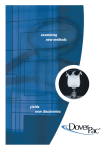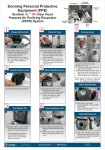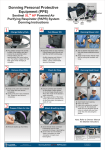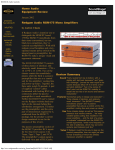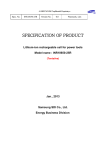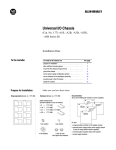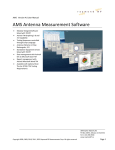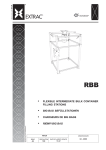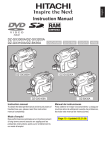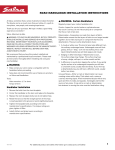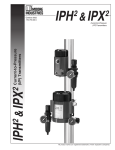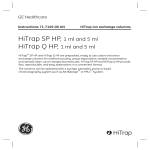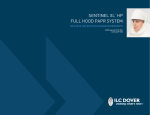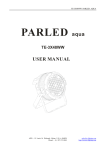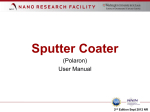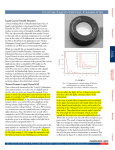Download examining new methods yields new discoveries
Transcript
ArmorFlex® 110 Film examining new methods yields new discoveries Table of Contents Why Do Our Customers Value ILC Dover? 3 Validated Containment THAT WORKS 4 Why DoverPac Containment System? 5 ArmorFlex® Family of Compliant Static Dissipative Films 6 ArmorFlex® 104 Film 7 ArmorFlex® 113 Film 9 ArmorFlex 114 Film 11 DoverPac 13 DoverPac - Contained Powder Discharge 15 DoverPac® - Contained Powder Charging 19 Coaxial DoverPac® - Nanogram Powder Transfer 23 ® ® ® ® G2Pac - <100µg/m3 Containment Powder Transfer 25 DoverPac Continuous Liner 23” Diameter - Contained Powder Discharge to Drums 26 DoverPac Continuous Liner 14” Diameter - Contained Powder Discharge to Drums 30 Continuous Liner Bag In Bag Out - Contained Transfer 34 ® ® Antistatic Drum Liners 36 Contained Processes - Flexible Enclosures / Glovebags 37 DoverPac® Document Transfer Enclosure 41 Drum Transfer System - Contained Drum Dispensing 43 Mill Containment System 47 Drum Sampling Enclosure System 49 Drum Sampling Enclosure FAQs 51 DoverPac® SF 53 DoverPac SF (BioPharmaceutical) - From Lab Scale Through Production Processes 55 Tray Dryer Enclosure Technology 57 ® Mill Containment System - Bohle BTS 100 59 Tablet Coater Containment System - O’Hara LCM Tablet Coater 61 Sales Agents 63 Why Do Our Customers Value ILC Dover? We keep the cost of making drugs down We make the medicine people take safer by protecting the drug product from contamination Lower cost of ownership with disposibles vs. capital No cross contamination eliminates need for dedicated facilities We keep the people who make medicine safe Life critical softgoods that are the key to the system ILC’s products do what they claim and we are there to support our process after the installation 3 ArmorFlex Validated ®Containment 110 Film THAT WORKS Containment Systems DoverPac® Our flagship product that offers the capability to offload and charge potent compounds Continuous Liners Multiple size continuous liner packs designed to support contained drum loading DoverPac®SF Charging system designed to interface with split butterfly valves or sanitary flanges Flexible Enclosures Standard and custom enclosures designed to provide containment for a range of process equipment One of our major customers says it best, ”You guys provide the only containment that works!” As the pioneer of flexible containment systems, ILC Dover has collaborated with our customers in the pharmaceutical industry to develop a range of validated API containment solutions that interface with a wide variety of process equipment. All of our products are designed to be safe, effective and user friendly. The same knowledge of flexible film and fabric systems and attention to detail that allows us to be NASA’s sole supplier of spacesuits, uniquely qualifies us to design and produce unparalleled containment systems. Some of the key benefits offered by using flexible containment: Ability to rapidly upgrade existing equipment to handle potent compounds Reduced capital costs Increased throughput when compared to other systems Improved ergonomics Drum Transfer System For offloading drummed materials in a safe and efficient manner at fixed and varying heights Faster project start-up cGMP through nanogram processing Mill Containment System Critical safety and cross contamination avoidance during particle size reduction operations Providing Flexible Containment Solutions to the Pharmaceutical Industry since 1997 4 Why DoverPac® Containment System? Containment Systems Multiple O-Ring Technology Our patented system of progressively advancing to a new clean zone on a canister allows multiple powder transfers without breaking containment. Contained Separation Crimps: The use of DoverPacs® and Continuous Liners is enhanced by this ILC innovation. Our crimps permit reliable, repeatable oneperson contained separation of sample sleeves and charging and discharging necks. Flexible Enclosures We know that existing pharmaceutical plants are sometimes cramped and many times not originally designed to support the processing of potent compounds. Our custom flexible enclosures permit safe, contained operation with a wide range of processing equipment. Engineering, Systems, Service Capability Custom engineered hardware interfaces with your specific processing equipment. On-site surveys to engineer your application offered. Product performance testing and customer training at ILC’s containment processing suite or on site provided. Personal and proactive customer service representatives available. Seasoned professional engineering team supports standard and custom containment solutions. We are the first to validate flexible containment. Manufacturing Each DoverPac® is manufactured in a clean working environment using custom sealing equipment designed and manufactured by ILC. This approach allows us to control the manufaturing quality of the product and to add design features that improve the overall reliabilty of the product. One such example is the fact that all DoverPacs® employ strong overlap seams even in 3-dimensional intersection areas (e.g., where the fill neck enters the main body of the liner). It’s this attention to design and manufacturing detail that makes DoverPac® the first and only choice for containment. 5 ArmorFlex® Family of Compliant Static Dissipative Films Containment Systems One of the key elements of our DoverPac® line of products is the ArmorFlex® material. These films are custom formulated by ILC to deliver superior elongation performance (nearly 500%) for ruggedness and high strength. This feature coupled with a unique blend of safe and effective anti-static additives allows all of the DoverPac® products to deliver reliable high-level containment. From the original ArmorFlex®104 to the most recent film, ArmorFlex®114, we pioneer the advancement of flexible materials. This is evidenced by the introduction of ArmorFlex®114, the first permanent, non-blooming static dissipative film to meet the 2002/72/EC (and amendments) Directive and EP 3.1.3. 6 ArmorFlex® 104 Film Containment Systems ArmorFlex® 104 Film Passes incendivity testing Designed and manufactured using only FDA compliant materials Verfied quality and reliability No animal-derived components Complies with USP Class VI No halogenated compounds and safe for incineration ArmorFlex® 104 was developed in 1997 and has been in use by pharmaceutical manufacturers globally ever since. Proven in myriad applications, ArmorFlex® 104 supports processes from wetcake to dry powder storage and transfer. 7 ArmorFlex®®104 ArmorFlex 104Film Film Solvent Contact Resistance Containment Systems Chemical Resistance Acetone Very Good Acetonitrile Excellent Anisole Very Good Physical Property Data Butyl Acetate Excellent Property Test Method Results Cyclohexane Very Good Cyclohexane – Ethyl Acetate (50/50) Puncture Resistance Fed Std 191-5120 11 lbf Very Good Tear Strength ASTM D 624-91 Die C 470 ppi (min) Dichloromethane Fair Diethylether Very Good Tensile Strength ASTM D 412-97 5500 psi (min) Elongation ASTM D 412-97 490% (min) Results Dimethylacetamide Very Good Ethanol Excellent Ethyl Acetate Excellent European Norm Data HCL (37.4%) Very Good EN Number Test Heptane Excellent HMDS Fair EN 388: 1994 Protection against mechanical risks EN 420: 1994, Paragraph 4.4.42 Determination of pH value KOH (50%) Excellent Methanol Very Good 2-Methoxyethanol Excellent n-Methylpiperazine Excellent n-Methypyrrolidone Excellent Mineral Oil Very Good NaOH (50%) Excellent Reagent (3A) Alcohol Very Good Tetrahydrofuran Very Good Toluene Fair Criteria % Change in Physical Properties Resistance 8 0 - 10 Excellent 10 - 20 Very Good 20 - 30 Good > 30 Fair CFR Conformance 21 CFR 177.1520 21 CFR 178.3130 21 CFR 182.90 Pass USP Conformance Conforms to USP 24 <661> for buffering capacity, heavy metals, non-volatile residues, residue on ignition, thermal analysis, and IR (ID identity). Passes USP Class VI (7 day implant) testing. ArmorFlex® 113 110 Film Containment Systems ArmorFlex® 113 Film Superior visual clarity, ideal for Flexible Enclosures and Flexible Isolators Polyethylene base film provides excellent solvent resistance Permanent antistat provides better than 1 x 1011 Ohms per square surface resistivity 5 year shelf life No animal derived components At ILC Dover we “create what’s next” by listening to our customers. In response to operators’ No incineration off-gassing concerns input we’ve developed a new addition to the ArmorFlex® family of films – AF 113. The clarity of the product makes this the clear film of choice for flexible enclosures and flexible isolators. www.doverpac.com [email protected] Ph 302.335.3911 x506 or 800.631.9567 ONE MOONWALKER RD, FREDERICA, DELAWARE USA 19946-2080 9 ArmorFlex®®113 ArmorFlex 113Film Film ArmorFlex® 113 Solvent Resistance Solvent Contact Recommendations Chemical Resistance Acetone Excellent Acetonitrile Excellent Anisole Good Butyl Acetate Very Good Cyclohexane Fair Cyclohexane – Ethyl Acetate (50/50) Good Dichloromethane Very Good Diethylether Excellent Dimethylacetamide Excellent Dimethylformamide Excellent Ethanol Excellent Ethyl Acetate Very Good HCL (37.4%) Excellent n-Heptane Good HMDS Excellent Isopropanol Excellent KOH (50%) Excellent Methanol Excellent 2-Methoxyethanol Excellent n-Methylpiperazine Very Good n-Methypyrrolidone Excellent Mineral Oil Very Good NaOH (50%) Excellent Reagent (3A) Alcohol Excellent Tetrahydrofuran Excellent Toluene Very Good Water, Distilled Excellent Containment Systems Mill impeller and screen change out The superior visibility provided by AF113 lets you see inside the enclosure as if looking through glass. Criteria % Change in Physical Properties Resistance 0 - 10 Excellent 10 - 20 Very Good 20 - 30 Good > 30 Fair Processing drums Providing Flexible Containment Solutions to the Pharmaceutical Industry since 1997 10 ArmorFlex® 114 Film Containment Systems ArmorFlex® 114 Film Complies with FDA 21 CFR Fully compliant to 2002/72/EC and amendments Meets test parameters of EP 3.1.3 Passes USP <661> Physicochemical Tests for Plastics Passes USP <88> Class VI (7 day implant) At ILC Dover we are always “creating what’s next” by listening carefully to our customers. In response to customer input and emerging regulations, we’ve developed a robust new film to support our DoverPac® Containment Systems. This revolutionary film, Passes <87> biological reactivity, in vitro No animal derived components 5-year shelf life Permanent antistat replaces migrating additives ArmorFlex® 114, delivers permanent Passes Chilworth incendivity tests static dissipative properties while Tested for solvent resistance meeting FDA and 2002/72/EC requirements for food contact DMF filed with FDA and EP 3.1.3 test conditions. 11 ArmorFlex 114Film Film ArmorFlex®®114 ArmorFlex® 114 Solvent Resistance Solvent Contact Recommendations Chemical Resistance Acetone Excellent Acetonitrile Excellent Anisole Good Butyl Acetate Good Cyclohexane Excellent Cyclohexane – Ethyl Acetate (50/50) Excellent Dichloromethane Excellent Diethylether Excellent Dimethylacetamide Excellent Dimethylformamide Excellent Ethanol Excellent Ethyl Acetate Excellent HCL (37.4%) Very Good n-Heptane Very Good HMDS Excellent Isopropanol Excellent KOH (50%) Very Good Methanol Excellent 2-Methoxyethanol Excellent Methylethyketone Excellent n-Methylpiperazine Excellent n-Methypyrrolidone Excellent Methyl-tert-butylether Excellent Mineral Oil Very Good Reagent (3A) Alcohol Excellent NaOH (50%) Excellent Tetrahydrofuran Very Good Toluene Fair Water, Distilled Excellent Charging mills with DoverPac® and offloading to IBC with transfer sleeves. Bag in-bag out sleeves Continuous liners Criteria % Change in Physical Properties Resistance 0 - 10 Excellent 10 - 20 Very Good 20 - 30 Good > 30 Fair Providing Flexible Containment Solutions to the Pharmaceutical Industry since 1997 12 Containment Systems DoverPac® Containment Systems Benefits Verified containment as a system Proven to be lowest cost of ownership ArmorFlex® 114 film is Static Dissipative with a permanent antistat, confirmed to 2002/72/EC and amendments, FDA CFR 21, and test requirements of EP 3.1.3 Standard and custom installations CE Marked configurations UN DOT approved configurations Lowest carbon footprint in a complete containment process 14” offloading and charging necks using ArmorFlex® for the crimping process Bag Out Sleeves to maintain high containment during DoverPac® change Sample sleeve can be designed into any DoverPac® for contained, tamper proof sampling DoverPac® PATENTED system for high containment connection to the o-ring canister. Containment proven using third party testing to SMEPAC protocol for <1.0 μg/m3 with results <250 nanograms/m3 O-rings are captured to prevent accidental loss to the process vessel during bag out operations (inlet & outlet necks) 13 DoverPac® Proven DoverPac® Attachment 14 DoverPac® - Contained Powder Discharge F L E X I B L E C O N TA I N M E N T T E C H N O L O G I E S Containment Systems Offloading Using the Individual DoverPac® System Contained processing to protect the operators cGMP processing in a completely closed operation to protect the product Available in sizes ranging from 20L to 2000L 100% inflation tested CE Marked System Description This easy-to-use system has been proven effective in containing active pharmaceutical ingredients and other hazardous compounds. Its use assures a safe and effective transfer of powders, an operational requirement that cannot be achieved with a standard FIBC or big bag. The DoverPac® contained powder transfer system includes a flexible ArmorFlex® liner with restraint for containing powders and a set of hardware that fits the flange of a vessel. While specific powders react differently due to their particle size, OEB 5 (<1.0 µg/m3) levels have been demonstrated on a task basis with results in the nanogram range. This is based on proven applications, third party testing to the “SMEPAC” protocols on similar designs, and the 100% inflation tests performed on the delivered systems. Significant capital cost savings over rigid isolation systems Significant reduction in cleaning time, waste, and validation expenses Integral sampling sleeve Static dissipative film with groundable restraint (type c) Uses ILC Dover’s Patented Technology Uses ILC Dover’s Patented Technology 15 DoverPac® - Contained Powder Discharge Containment Systems F L E X I B L E C O N TA I N M E N T T E C H N O L O G I E S Basic Offloading Process Steps Materials ArmorFlex® is ILC Dover's proprietary family of films used exclusively in the DoverPac® family of high potency flexible containment products. Details are available in a databook upon request. Offloading Canister and Transition Adapter The canister pictured at the right shows the set up on a straight transition adapter at ILC’s test facility. While canisters typically are 316L stainless steel, Hastelloy® canisters also are available. This unit has an initial groove for the canister end cap, additional grooves for liner attachment (typically 5 or 10 grooves depending on process requirements and available height), and 1 groove for the cleaning sleeve or clean-in-place (CIP) sleeve attachment. Attach Bag out stub The canister is supplied with a 12” sanitary flange on each end. This allows for a common design for attachment to vessel specific transition adapters and our CIP tundish. The custom transition adapter is fitted with a flange on one end that interfaces with the vessel flange (or valve that is in-line on the vessel flange). The opposite end is a 12” sanitary flange that interfaces with the canister. For flanges smaller than 12", a conical transition adapter is used to allow powder flow directly into the vessel without accumulation on the hardware. The adapter also is fitted with a vacuum flange port with a 1/2” sanitary flange for attachment to the vacuum and nitrogen sources to allow inert processing. Canister and Transition Adapter Attached to ILC Dover Test Rig. This hardware is supplied with a 240 grit (15RA) internal finish and a 180 grit (32 RA) external finish. Other materials and finishes can be quoted separately. Purge/Vacuum Arrangement To sample, extend sleeve and fill Note: Common vacuum/purge supply connection to HEPA filter provides backwash function to extend filter life. Place crimp cap on crimp body 16 DoverPac® - Contained Powder Discharge Containment Systems Containment Systems FlexLoc Clamp The FlexLoc clamp is used to secure the neck of the liner to the canister. Construction of the molded clamp is of FDA compliant elastomer with integrated stainless steel band clamp. The clamp has a molded ridge along one surface to help install it in the correct orientation. The FlexLoc functions to prevent powder from going between the inside of the liner and the outside of the canister to minimize cleaning operations. The clamp is designed to operate in the offloading and the charging operations. ILC crimps have been designed and tested to compress standard diameter liners and sleeves made with ArmorFlex® film Load crimp into installation tool Crimp Separation Kit Contained separation between vessels and DoverPacs® is achieved through a Crimp Separation Kit, using ILC's FlexLoc Clamp uniquely designed crimp system. Crimps are color coded to assure that the right crimp is selected for the right product. Red crimps are used for the 14” necks, blue crimps are for the 23" diameter continuous liners, and yellow crimps are for the 4" diameter sample sleeve on the DoverPacs® . Position crimp A Crimp Separation Kit includes: • 200 Crimps • 1 Crimp Hand tool Squeeze tool until crimps are engaged -- then release tool • 1 Cutter • 100 Cable Ties (7” Nylon) • 1 User's Manual Additional spare items can be ordered separately by their individual model/part numbers. The crimps have been designed and tested to compress the standard diameters liners made with ArmorFlex® film. Use on any other system will preclude the crimps from closing correctly, which could result in operator and product exposures. Cut and separate The hand tool applies two crimps at once. The cutter is used to cut between the two crimps, and then the cap is slid onto the closed crimp body. Install crimp cap on crimp body 17 DoverPac® - Contained Powder Discharge Containment F L E X I B L E C O N TA I N M E N T T E C H N O L O G I E S Systems Containment Systems Typical DoverPac® Discharging Arrangement Other System Components and Accessories Other system components and accessories developed by ILC Dover to support contained pharmaceutical ingredient processing include: • Wash In Place Enclosure • Clean In Place System • In Line Filter Kit 18 DoverPac® - Contained Powder Transfer F L E X I B L E C O N TA I N M E N T T E C H N O L O G I E S Containment Systems Charging Using the Individual DoverPac® System Contained processing to protect the operators cGMP processing in a completely closed operation to protect the product Available in sizes ranging from 20L to 2000L 100% inflation tested CE Marked Significant capital cost System Description This easy-to-use system has been proven effective in containing active pharmaceutical ingredients and other hazardous compounds to assure a safe and effective transfer of powders, an operational requirement that cannot be achieved with a standard FIBC or big bag. The DoverPac® contained powder transfer system includes a flexible ArmorFlex® liner with restraint for containing powders and a set of hardware that fits the flange of a vessel. While specific powders react differently due to their particle size, OEB 5 (<1.0 µg/m3) levels have been demonstrated on a task basis with results in the nanogram range. This is based on proven applications, third party testing to the “SMEPAC” protocols on similar designs, and the 100% inflation tests performed on the delivered systems. savings over multiple rigid isolation systems Significant reduction in cleaning time, waste, and validation expenses Static dissipative film with groundable restraint (type c) Uses ILC Dover’s Patented Technology Uses ILC Dover’s Patented Technology 19 DoverPac® - Contained Powder Transfer Containment F L E X I B L E C O N TA I N M E N T T E C H N O L O G I E S Basic Process Flow of a Contained, Flexible Charging System Systems Materials ArmorFlex® is ILC Dover's proprietary family of films used exclusively in the DoverPac® family of high potency flexible containment products. Details are available in a databook upon request. Charging Canister and Transition Adapter Lift over vessel The canister pictured at the right shows the set up on a straight transition adapter at ILC’s test facility. While canisters typically are 316L stainless steel, Hastelloy® canisters also are available. This unit has an initial groove for the canister end cap, additional grooves for liner attachment (typically 5 or 10 grooves depending on process Canister Attached to ILC Dover Test Rig requirements and available height), and 1 groove for the cleaning sleeve or clean-inplace (CIP) sleeve attachment. The canister is supplied with a 12” sanitary flange on each end. This allows for a common design for attachment to vessel specific transition adapters and our CIP tundish. Attach liner then bag out stub The custom transition adapter is fitted with a flange on one end that interfaces with the vessel flange (or valve that is in-line on the vessel flange). The opposite end is a 12” sanitary flange that interfaces with the canister. For flanges smaller than 12", a conical transition adapter is used to allow powder flow directly into the vessel without accumulation on the hardware. The adapter also is fitted with a vacuum flange port with a 1/2” sanitary flange for attachment to the vacuum and nitrogen sources to allow inert processing. Purge/Vacuum Arrangement Empty Note: Common vacuum/purge supply connection to HEPA filter provides backwash function to extend filter life. Crimp 20 DoverPac® - Contained Powder Transfer Containment Systems Containment Systems This hardware is supplied with a 240 grit (15 RA) internal finish and a 180 grit (32 RA) external finish. (Other materials and finishes also can be provided.) Please note that for vessels that normally operate under pressure, a valve is required to isolate the liner from the vessel while the vessel is under pressure. This pressure-rated valve is normally supplied by the customer and installed between the vessel and the transition adapter. FlexLoc Clamp The FlexLoc clamp is used to secure the neck of the liner to the canister. Construction of the molded clamp is of FDA compliant elastomer with integrated stainless steel band clamp. The clamp has a molded ridge along one surface to help install it in the correct orientation. FlexLoc Clamp ILC crimps have been designed and tested to compress standard diameter liners made with ArmorFlex® film The FlexLoc functions to prevent powder from going between the inside of the liner and the outside of the canister to minimize cleaning operations. The clamp is designed to operate in the offloading and the charging operations. Crimp Separation Kit Load crimp into installation tool Contained separation between vessels and DoverPacs® is achieved through a Crimp Separation Kit, using ILC's uniquely designed crimp system. Crimps are color coded to assure that the right crimp is selected for the right product. Red crimps are used for the 14” necks on the DoverPacs®. Position crimp A Crimp Separation Kit includes: • 200 Crimps • 1 Crimp Hand tool • 1 Cutter • 100 Cable Ties (7” Nylon) • 1 User's Manual Squeeze tool until crimps are engaged -- then release tool Additional spare items can be ordered separately by their individual model/part numbers. After filling, the liner is twisted and crimped closed. The hand tool applies two crimps at once. The cutter is used to cut between the two crimps, and then the cap is slid onto the closed crimp body. Cut and separate Install crimp cap on crimp body 21 DoverPac® - Contained Powder Transfer Containment F L E X I B L E C O N TA I N M E N T T E C H N O L O G I E S Containment Systems Use of Lifting Bar Lifting Bars A lifting bar and hoist are used in order to position the DoverPac® restraints over the vessel interface for charging. The lifting bar comes in two sizes to accommodate DoverPac® sizes. Hoists typically are supplied by the customer. Typical DoverPac® Charging Arrangement Attaching the restraint to lifting bar Securing the liner neck Other System Components and Accessories Other system components and accessories developed by ILC Dover to support contained pharmaceutical ingredient processing include: • Wash In Place Enclosure • Clean In Place System • In Line Filter Kit 22 Systems Coaxial DoverPac® - Nanogram Powder Transfer Containment Systems O verview The Coaxial neck DoverPac® was originally designed to allow secondary containment to be used with a DoverPac® in the late 1990’s for charging and offloading vessels through isolators. Given the increase in highly potent API manufacturing, the use of this system with either rigid isolators or flexible enclosures is a complimentary processing option. The Coaxial Neck DoverPac® serves the dual function of contained transfer and storage system. These are available in standard 45, 185, 400, and 700Liter volumes. Custom sizes can also be accommodated. 1. Vessel Outlet 2. Flexible Enclosure 3. Inner Neck Attachment 4. Support Frame 5. Outer Neck Attachment HOW DOES IT WORK? This system is designed to provide containment to the OEB 5 (less than 1 μg/m3 with a goal of below 200 nanograms/m3 on a task basis). To achieve this, the secondary containment (i.e. flexible enclosure and the outer neck) at the primary connection points are applied. Figure 1 shows the offloading set up during exposure monitoring trials. 1 3 2 The installation sequence follows: • The top of the enclosure is attached to the first canister on the vessel outlet. • The bottom of the enclosure is attached to the canister on the support frame. • The external neck on the DoverPac® is then attached to the outlet point of the canister on the frame. 4 5 The internal neck of the DoverPac® is pulled up through the lower canister and is attached to the groove on the vessel canister by using the integral glove sleeves on the flexible enclosure. Figure 1 • Once the vessel is offloaded, the internal neck is crimped off and pushed back down through the canister on the frame by using the enclosure to access the neck area. The operator then extracts his/her arms from the enclosure and crimps off the external neck. The crimping process, Figure 2, is employed for the contained separation operations. This process consists of installing two injection molded crimps into the hand tool, twisting the liner neck, ratcheting the crimps closed, cutting between the two crimps, and installing the protective cap. Figure 2 23 Coaxial DoverPac® - Nanogram Powder Transfer In addition to offloading vessels, the system can be applied to charging processes as shown in Figure 3. The flexible enclosure design is either supported by a frame or bungee cords. 1. Vessel Inlet 2. Flexible Enclosure 3. Inner Neck Attachment 4. Outer Neck Attachment 5. DoverPac® 5 F E AT U R E S Standard DoverPac® hardware interfaces • 4 Standard and custom sizes • Two barriers for containment • Product contact with regulatory compliant materials • 2 BENEFITS 3 1 Figure 3 • Uses a broad range of solutions depending on containment level needed • Tailored to specific batch sizes • Provides nanogram levels of protection without high capital costs • Eliminates risk to product W H AT C O N TA I N M E N T L E V E L P R O V I D E D ? OEB 5 in the nanogram levels. The table below outlines a summary of the results achieved. Sample Set N Personal Sample Breathing Zone PSBZ – with outlier event 12 PSBZ – without outlier event 10 Mean Range Lowest Range Highest Standard Deviation Standard Error Coefficient of Variation 95% Confidence Interval for Population Mean 0.077 μg/m3 0.014 μg/m3 0.50 μg/m3 0.136 μg/m3 0.039 1.8 -0.00980 to 0.163 μg/m3 0.032 μg/m3 0.014 μg/m3 0.084 μg/m3 0.023 μg/m3 0.0074 0.72 0.0156 to 0.0490 μg/m3 WHY USE THIS OVER OTHER TECHNOLOGIES? The cost of ownership, ergonomic advantages, and speed of delivery benefits of this flexible solution far outweigh those of rigid isolation systems O T H E R P O T E N T I A L A P P L I C AT I O N S This technology is applicable for charging and offloading most vessels. This includes, but is not limited to, reactors (charging only), dryers, blenders and granulators. Uses ILC Dover’s Patented Technology 24 G2Pac - <100μg/m³ Containment Powder Transfer Features: Durable ArmorFlex® liner with groundable restraint (type C) Individual necks with bag-out sleeve to support charging and offloading operations Secure, dust-free hardware interface to process equipment Sized to interface with standard pallet Interfaces with ILC contained separation crimps Benefits: Economical containment Supports dust-free operation Reduced cross contamination risks Protects operator One-person operation Eclipsing the traditional FIBC, the G2Pac is engineered to address the issues that arise from uncontrolled processes, including compromised facility cleanliness, cross contamination risks and employee exposure to unnecessary hazards. G2Pac supports cGMP operations. Feature Restraint and Liner Yes Charge/Offloading Neck Yes ArmorFlex® 104 Yes Sizing 700L, 560L, 185L Integral Bag-Out Sleeves for Contained Changeover Yes Interfaces with Contained Separation Crimps Yes 25 DoverPac® Continuous Liner 23” Dia - Contained Powder Discharge to Drums F L E X I B L E C O N TA I N M E N T T E C H N O L O G I E S Containment Systems 23”(584 mm) Diameter Continuous Liner Systems Contained processing to protect the operators cGMP processing in a completely closed operation to protect the product One person operation Pre-loaded liner material minimizes processing time Inert atmosphere offloading of products. System Description This easy-to-use system has been proven effective in containing active pharmaceutical ingredients and other hazardous compounds to assure a safe and effective transfer of powders – an operational requirement that cannot be achieved with a standard drum liner. The 23” (584 mm) diameter continuous liner system is designed to allow continuous offloading of powders into drums. This contained powder transfer system consists primarily of a set of hardware that fits the flange of a vessel and a factory packed kit of liners that are delivered in a pack ready to install on the canister. Standard systems are supplied in continuous sleeves. Sample sleeves are often added as custom applications. 26 Significant reduction in cleaning time, waste, and validation expenses The system is available in the following sizes: Pack Length Number of Drums per Pack* 50’ 10 100’ 20 150’ 30 * assumes 5’ of liner per drum to accommodate drum height and crimping. Actual usage will depend on the drum height DoverPac® Continuous Liner 23” Dia - Contained Powder Discharge to Drums F L E X I B L E C O N TA I N M E N T T E C H N O L O G I E S Containment Systems The basic steps for operating this easy to use system are shown in these continuous liner process steps Materials ArmorFlex® is ILC Dover's proprietary family of films used exclusively in the DoverPac® family of high potency flexible containment products. These films pass incendivity testing and are designed and manufactured using FDA & EU compliant materials. Continuous Liner Kit Versatile hardware easily mounts to vessel discharge port Continuous liner pack is installed The Continuous Liner Kit includes: • Canister • Cage • Shroud • Pack Protector • 12” Band Clamp • Sanitary Clamp and Gasket • FlexLoc Clamp • 23” Crimp Kit • Turn Table • Continuous Liner Pack The canister will attach to the vessel using a transition adapter. The transition adapter has a nitrogen purge/vent to discharge into an inert atmosphere (if required). Continuous Bag-in/Bag-out System Sleeve is pulled into drum and filled This system can be supplied with an alpha/beta port interface to allow attachment to an isolator as depicted in the drawing. This allows the contained removal of product containers, samples, or waste from the isolator. Unique DoverPac® crimping system is used to separate filled drum Next sleeve is pulled into drum 27 DoverPac® Continuous Liner 23” Dia - Contained Powder Discharge to Drums Containment Systems Containment Systems Crimp Separation Kit The 23” crimp separation kit is used to separate the filled drum from the unused pack. The 23” Crimp Separation (start-up) Kit includes: • 200 Crimps • 1 Crimp Hand tool • 1 Cutter ILC crimps have been designed and tested to compress standard diameter liners made with ArmorFlex® film • 100 Cable Ties (7” Nylon) • 1 User's Manual Additional spare items can be ordered separately by their individual model/part numbers. Load crimp into installation tool The crimps have been designed and tested to compress the standard 23” diameter liners made with ArmorFlex® film. Use on any other system will preclude the crimps from closing correctly, which could result in operator and product exposures. The hand tool applies two crimps at once. The cutter is then used to cut between the two crimps, and the cap is slid onto the closed crimp body. Position crimp FlexLoc Clamp The FlexLoc clamp is used to secure the neck of the liner to the canister. Construction of the molded clamp is of FDA compliant elastomer with integrated stainless steel band clamp. The clamp has a molded ridge along one surface to help install it in the correct orientation. FlexLoc Clamp The FlexLoc functions to prevent powder from going between the inside of the liner and the outside of the canister to minimize cleaning operations. The clamp is designed to operate in the offloading and the charging operations. Squeeze tool until crimps are engaged -- then release tool Containment Levels While specific powders react differently due to their particle size, customer testing has shown that these systems are capable of providing containment levels to below 1 µg/m3 in applications around the world. Cut and separate Install crimp cap on crimp body 28 DoverPac® Continuous Liner 23” Dia - Contained Powder Discharge to Drums Containment F L E X I B L E C O N TA I N M E N T T E C H N O L O G I E S Systems Continuous Liner Discharge Arrangement Other System Components and Accessories Other system components and accessories developed by ILC Dover to support contained pharmaceutical ingredient processing include: • Wash In Place Enclosure • Clean In Place System • In Line Filter Kit Applications • Product offloading from sifters, mills, blenders, centrifuges, dryers and other process equipment. • Bag-in/Bag-out 29 DoverPac® Continuous Liner 14” Dia - Contained Powder Discharge to Drums F L E X I B L E C O N TA I N M E N T T E C H N O L O G I E S Containment Systems 14” (355.6mm) Diameter Continuous Liner Systems <1µg/m3 contained processing to protect the operators with results in the 250 nanogram/m3 range cGMP processing in a completely closed operation to protect the product One person operation System Description This easy-to-use system has been proven effective in containing active pharmaceutical ingredients and other hazardous compounds. Inert atmosphere offloading of products This system uses a five-liner canister, which will allow up to five contained changes of the 30' packs before cleaning or canister recovery is required. This system also provides the 30’ liner packs pre-bundled, which reduces operator time. Its use assures a safe and effective transfer of powders, tablets, vials, tools, and trash. Uses ILC Dover’s Patented Technology Uses ILC Dover’s Patented Technology 30 Significant reduction in cleaning time, waste, and validation expenses DoverPac® Continuous Liner 14” Dia - Contained Powder Discharge to Drums F L E X I B L E C O N TA I N M E N T T E C H N O L O G I E S Containment Systems Materials ArmorFlex® is ILC Dover's proprietary family of films used exclusively in the DoverPac® family of high potency flexible containment products. These films pass incendivity testing and are designed and manufactured using FDA & EU compliant materials. System Components The system components for contained discharging as pictured here consist of: • 8” Sanitary Flange Five Liner SS Canister (used to make Attach neck of continuous liner to canister Install a band clamp Slide the pack onto the canister Install the outer shroud Unsnap the retaining snaps on the pack • • • • • • • • contained connection of DoverPacs®) 30’ Continuous Liner Pack Fabric Outer Shroud Pack Protector 8” Stainless Steel Band 8” Sanitary Clamp 8” Sanitary Gasket 14” Crimp Kit 8” FlexLoc Clamp This system can be supplied with an alpha/beta port interface to allow attachment to an isolator as depicted in the drawing. This allows the contained removal of product containers, samples, or waste from the isolator. Continuous Bag-in/Bag-out System Pull down liner material to start processing 31 DoverPac® Continuous Liner 14” Dia - Contained Powder Discharge to Drums Containment Systems Containment Systems Crimp Separation Kit The 14” crimp kit is used to separate the filled drum from the unused pack. The 14” Crimp Separation (start-up) Kit includes: • 200 Crimps ILC crimps have been designed and tested to compress standard diameter liners and sleeves made with ArmorFlex® film • 1 Crimp Hand tool • 1 Cutter • 100 Cable Ties (7” Nylon) • 1 User's Manual Load crimp into installation tool Additional spare items can be ordered separately by their individual model/part numbers. The crimps have been designed and tested to compress the standard 14” diameter liners made with ArmorFlex® film. Use on any other system will preclude the crimps from closing correctly, which could result in operator and product exposures. Position crimp The hand tool applies two crimps at once. The cutter is then used to cut between the two crimps, and the cap is slid onto the closed crimp body. This system has been proven effective in containing active pharmaceutical ingredients and other hazardous compounds to assure a safe and effective transfer of powders, tablets, vials, tools, and trash – an operational requirement that cannot be achieved with a standard drum liner. Squeeze tool until crimps are engaged -- then release tool Containment Levels While specific powders react differently due to their particle size, customer testing has shown that these systems are capable of providing containment levels to below 1 µg/m3 on a task basis in applications around the world. Cut and separate Install crimp cap on crimp body 32 DoverPac® Continuous Liner 14” Dia - Contained Powder Discharge to Drums F L E X I B L E C O N TA I N M E N T T E C H N O L O G I E S Containment Systems Containment Systems FlexLoc Clamp The FlexLoc clamp is used to secure the neck of the liner to the canister. Construction of the molded clamp is of FDA compliant elastomer with integrated stainless steel band clamp. The clamp has a molded ridge along one surface to help install it in the correct orientation. FlexLoc Clamp It functions to prevent powder from going between the inside of the liner and the outside of the canister to minimize cleaning operations. The FlexLoc clamp is designed to operate in the offloading and the charging operations. Other System Components and Accessories Other system components and accessories developed by ILC Dover to support contained pharmaceutical ingredient processing include: • Wash In Place Enclosure • Clean In Place System • In Line Filter Kit Applications • Product offloading • Tablet offloading • Bag-in/Bag-out 33 Continuous Liner Bag in Bag out - Contained Transfer Containment O verview Systems The DoverPac® Bag In/Bag Out (BIBO) system is a family of contained transfer designs for multiple processes. The primary components for this validated operation consist of multiple groove canisters, docking interface hardware, and softgoods in either continuous liner form or discreet liners as illustrated below in the continuous liner application. Isolator 14” Continuous Bag-Out/Bag-in System 23” Continuous Drum Liner System This system can be applied to any rigid isolator. The use of multiple size canisters allows a broad range of needs to be met, systems can be retrofit to existing assets, and the BIBO system requires a low capital outlay. O peration By utilizing the patented multi o-ring and flexible containment techniques developed by ILC Dover, this system builds on proven DoverPac® designs. The hardware is docked to the containment enclosure either by using the existing alpha/beta port hardware or bolting directly to the wall of the rigid isolator. The liner is then extended over the item to be introduced or removed from the enclosure and then crimped off to complete the contained transfer. Continuous Liner being attached to isolator Operator shown “bagging in” a tool Operator shown “bagging out” a sample Uses ILC Dover’s Patented Technology 34 Continuous Liner Bag in Bag out - Contained Transfer Containment Systems Accessories and support equipment include a lifting stand to help support the larger canister size, crimps and the FlexLoc™. Crimping tool/crimps Lifting Stand FlexLoc™ A pplications – C urrent and P otential Current applications: tool pass through on 22 rigid isolators at one international Pharma manufacturer’s site, trash bag out, sample bottle transfer, tablet transfer for testing/analysis, pre-packaged seed/ API processing after tare weight process Other potential applications: document transfer, gamma irradiated for sterile transfer operation, wall mounted in process suite for contained pass thrus. C ontainment L evel Nanogram containment levels demonstrated during task based operations – see data below. Sample* Location Duration of Operation (mins.) Measured Airborne Concentration (µg/m3) Source Sample (AS-0BH) At Bagout Port 31 <0.017 Operator #1 (PSBZ) On Shoulder 31 0.017 Operator # 1 (PSBZ) On Shoulder 30 <0.017 Operator # 2 (PSBZ) On Shoulder 30 <0.018 Source Sample (AS-0BZ) At Bagout Port 30 <0.017 * Finished Product, raw materials, cleaning materials, waste materials F eatures BENEFITS • Validated system • Minimizes risk during operation • Proven and tested softgoods • ArmorFlex films are regulatory compliant • Disposable • • Bolt on or RTP Interfaces available Eliminates concern of cross contamination due to “pneumatic” effect of low end films leaking • Reduced cleaning and cleaning validation costs • Reduced process time and cost by eliminating multiple RTP canisters • Eliminates RTP seal maintenace 35 Antistatic Drum Liners Containment Systems Static Dissipative Drum Liners Features Clear durable film Chilworth tested– passes incendivity testing Available in all ArmorFlex® films Up to 5 year shelf life based on film selected DoverPac® static dissipative drum liners provide you with the confidence to safely transfer and store a wide range of API’s and other powders. As the pioneer of flexible containment systems for the pharmaceutical industry, ILC Dover offers drum liners constructed from our durable ArmorFlex® film–the same material used in our DoverPac® API containment system. 36 Contained Processes - Flexible Enclosures / Glovebags F L E X I B L E C O N TA I N M E N T T E C H N O L O G I E S Containment Systems Flexible Enclosures Allows operators to work in shirt sleeve environment – increases efficiency 3rd party validated Nanogram containment levels using SMEPAC guidelines Economical Fast turnaround/installation Fit check on lab scale fluid bed dryer ILC Dover’s flexible enclosures take the concept of a traditional flexible glove bag to a new level. Using the same reliable fabrication techniques and proven containment design features found on our DoverPac® family of products, we’ve produced a line of flexible enclosures adaptable to a wide range of existing equipment. These enclosures save time and money by allowing you to retrofit existing processing equipment while achieving nanogram containment levels. All materials meet FDA standards and the design accommodates cGMP as well as operator ergonomics. Compatible with a wide range of existing equipment for retrofit Design makes use of existing DoverPac® containment details such as crimps, bag/out sleeves, and o-ring interface canisters Ergonomics are improved with an increased range of motion Designs support separation of process and technical areas Where applicable, entire piece of equipment can be contained 37 Contained Processes - Flexible Enclosures / Glovebags F L E X I B L E C O N TA I N M E N T T E C H N O L O G I E S Containment Systems Tablet Press/Deduster Flexible Enclosure • Powder added using a DoverPac® and canister interface • A series of glove sleeves permit easy press operation • Continuous bag-out sleeve supports tablet sampling/analysis • Unexpected maintenance can be performed using bag out sleeve and gloves Unique base design/interface • Eliminates the need for zippers • Stainless steel construction • Utilities can be plumbed through base • Fork lift compatible allows for easy repositioning • Base can be used to connect to wash-in-place (WIP) system Enclosures designed to work with: • Blending • Milling • Tableting • Weighing • Subdividing More cost effective than: • Rigid isolators • Downflow booths Lab Scale Analytical/Blending Process Train • New equipment • Product enters through bag-in sleeves • Operation of equipment accommodated via glove sleeves • Integration of process steps through ILC Dover canister interface • Process train can be expanded to include sub-dividing, milling, tableting, etc. 38 Contained Processes - Flexible Enclosures / Glovebags Containment Systems Containment Systems Weighing and Dispensing • Utilities through pan • Used with standard lab equipment Mill Flexible Enclosures L1A Fitzmill • Powder added at top using DoverPac® addition technique or scooped in by hand • Milled powder discharged into DoverPac®, IBC or vessels Granulator Overdrive Mill enclosure with shroud removed and fully deployed to allow use of glove sleeves for cleaning and maintenance • Mobile frame allows use in multiple suites • Clear film and bungee attachments optimize ergonomics ILC Dover...pioneers of flexible containment. 39 Contained Processes - Flexible Enclosures / Glovebags Containment Systems F L E X I B L E C O N TA I N M E N T T E C H N O L O G I E S Contain S Tablet Coater Enclosure • Tablets bagged in/out through sleeve • Glove sleeves allow full operator access IBC Transfer • Milled powder or finished product • Tare weighing in process transfer Dispensing device enclosure with transfer sleeve to IBC or downstream process 40 Document Transfer Enclosure Containment O verview Systems The Flexible Document Transfer Enclosure is designed to allow paperwork used in pharmaceutical processing to be handled in a contained way so that powders are not transferred onto the documents and to areas or individuals that are not protected. The enclosure can be manufactured from a clear ArmorFlex® or polyurethane film that will allow for room light to illuminate the inside of the enclosure for easy viewing and writing on the documents. H ow does the system work ? Documents, writing implements, and baggies for enclosing the finished paperwork are preloaded into the enclosure. A set of glove sleeves (left hand and right hand) are integral to the front of the enclosure at an approximate height of 48”. Due to the flexibility of the enclosure, the operators will be able to work at heights approximately +/- 5” from the glove sleeve centerline. This flexibility is provided by the nature of the films employed and the use of bungee cords that allow the enclosure to move with the operator. On the side opposite of the Glove Sleeves will be a zipper that is used as a pass-through for the documents. A bag in/bag out (BIBO) canister can also be provide as an optional method for transfer (as shown in the photograph). Space is also available to store plastic bags that can be used to contain the documents once all work is completed. A stainless steel frame is used to support the enclosure which includes casters to make the unit portable. The frame will include a rigid plate to use for support during writing. The top half of the frame can be provided as a table mounted system. Frames are typically available in 304 or 316L Stainless Steel. Other materials can be provided as required. The typical document transfer enclosure is sized for dimensions of 24” wide x 24” high x 24” deep. Custom sizes are also available. F eatures Clear film allows use of existing light from the suite • Passive system meets ATEX and Ex ratings • Re-usable for extended campaigns • Portable • Small footprint does not take up a lot of floor space • 41 Document Transfer Enclosure Containment Systems B enefits No cross contamination transfer to documents and then to other parts of the plant • Ergonomics are maximized with flexible materials • Reduced cleaning and cleaning validation • Low capital and operating cost • Speed of implementation • Production and Lab processes supported • W hat containment level provided ? OEB 5 with results in the nanogram range. This is anticipated given third party test results from similar designs and the 100% inflation tests performed on the deliverable enclosures. W hy use this over other technologies ? The cost of ownership, ergonomic advantages, and speed of delivery benefits of this flexible solution far outweigh those of rigid isolation systems. O ther potential A pplications Sampling • Dispensing • Product Analysis • 42 Drum Transfer System - Contained Drum Dispensing Containment Systems O verview Flexible Containment for offloading drummed materials in a safe and efficient manner is provided by the Drum Transfer System (DTS) platform, at fixed and varying heights. 1 2 1. Flexible Enclosure 2. Outer Drum Sleeve 3. DTS Enclosure Frame 4. DTS Base Frame 5. Outlet Canister 6. Lifter 3 5 6 4 Figure 1a – Fixed Height Lifter Figure 1b – Variable Height Lifter The DTS consists of an enclosure attachment frame, a support stand, a drum lifter, an enclosure, an outer drum sleeve, and discharge softgoods that are dependent upon your process equipment. The basic process steps include: Attach the enclosure to the frame. • Stretch the bottom opening of the Drum Sleeve over the drum and attach the sleeve to the ring on the back of the frame. • Pull the drum slightly into the enclosure and open the inner drum liner using the integral gloves on the enclosure. • Scoop/pour powder into the process equipment to be utilized. • Put trash in the empty drum and move the drum back out of the ring with the translating arm of the lifter. • Twist and crimp the Drum Transfer Sleeve for disposal of the drum. • Attach a new sleeve to a new drum and attach the sleeve over the stub remaining from the previous drum. Pull the stub into the enclosure to allow a clear pass through for the drum and repeat the process steps above. • 43 Drum Transfer System - Contained Drum Dispensing H ow does the system work ? The Enclosure Frame sits on a series of bases offering a modular approach to processing drums in a contained fashion. This provides the benefit of processing into various mills, DoverPacs® and other vessels. The entire assembly is mobile and can be wheeled over the piece of process equipment to be charged. The castors used here are conductive. Two wheels are locking while the other two pivot for steering. The enclosure functions as a flexible isolator. It is attached to the frame at the drum inlet ring and the outlet canister. Bungee cords are used to attach the enclosure to the frame and allow the enclosure to move with the operator to take advantage of the system’s built in flexibility. Hepa Filters The drum’s inner liner can then be accessed from the enclosure after the outer drum liner is removed as depicted here. Glove Sleeves Multi Use Sleeve The drum lifting unit is provided as part of the system. The lifter is pneumatic powered to lift and tilt the drum into position. The unit is a stainless steel construction and meets cGMP requirements.The maximum lift capacity of the standard unit is 100 Kg though larger lifts can be provided. The outlet canister supplied with the frame is typically our 5 liner, multiple o-ring groove system. For transfer direct to a process vessel a Transfer Sleeve is used. If filling with a DoverPac® is required, the canister supports interface to this containment technology. Bungi Cords Figure 2 W hat containment level provided ? OEB 5 with results in the nanogram range. This is based on proven applications, third party testing to the “SMEPAC” protocols, and the 100% inflation tests performed on the deliverable enclosures. W hy use this over other technologies ? The cost of ownership, ergonomic advantages, and speed of delivery benefits of this flexible solution far outweigh those of rigid isolation systems. A pplications Given the modularity features designed into the Drum Transfer System, contained transfer of drummed powders for the following applications is possible: M illing In the application pictured in Figure 3, powder is processed from a drum, through a mill (a Quadro Sifter in this example), into a stainless steel Intermediate Bulk Container (IBC). An interface to the mill is provided at the outlet of the Enclosure frame using a transfer sleeve. A similar sleeve is used to go from the outlet of the mill to the inlet of the IBC. Figure 3 44 Drum Transfer System - Contained Drum Dispensing In Figure 4, the milled powder is processed into a DoverPac® for future charging into a vessel. The example pictured uses a Quadro overdrive mill. This same approach has been accomplished with the Quadro under drive mill as well as other mills. In this application, a transfer sleeve would be attached to the discharge canister of the DTS frame and to the inlet canister on the mill. S ubdividing Using the DTS, a scale can be placed either inside the enclosure or just underneath it between the support tray and the enclosure. In this approach, the discharge canister was moved to the side to allow room for the scale. Figure 4 On a larger size system, like the BNL repackaging effort discussed in the next paragraph, the DTS was placed around a floor scale so that a tare weight was measured. In this instance a Sartorius scale was used but others can be accommodated. In this type of application it is important to confirm the interface sizes. R epackaging We have worked recently with a repackaging company, BNL Labs, for an application with one of our customers in Ireland. In this application, drums and bags of intermediate materials were transferred directly into DoverPacs®. These were for 185L, 400L and 700L sizes. Figure 5 The customer would have rejected any lot of repackaged materials if any powder were seen on the outside of the restraint. In order to be successful, BNL adopted our Drum Transfer Station. C harging to vessels The Transfer Sleeve between the bottom of the DTS and the inlet of the next piece of equipment is depicted in Figure 6. This uses our standard technology of multiple groove o-rings and bag out techniques. The Transfer Sleeve between the enclosure outlet and the process equipment inlet will be sized using our standard 12” hardware. In this case, we will be able to use our unique crimp system for contained separation. Figure 6 After processing, the Transfer Sleeve will be twisted and crimped closed using the red, 14” crimps. The hand tool applies two crimps at once. The cutter is then used to cut between the two crimps and the cap is slid onto the closed crimp body. In addition, the DoverLoc™, a molded clamp that secures the liner at the bottom interface point of the canister, supports the twisting/crimp operation and minimizes cleaning. 45 Drum Transfer System - Contained Drum Dispensing Feature Benefit Flexible enclosure follows operator’s movements Ergonomic performance is better than rigid system Fits a wider range of operator sizes without ergonomic issues of rigid designs Lightweight, portable design Can move to process area when needed, freeing room in process suite when not in use unlike a rigid, fixed system Better utilization of facilities Disposable Significant operational cost savings in cleaning time and validation Third Party proven containment Engineered process control Protection of operator No product loss of expensive APIs Reduced capital cost over rigid systems Significant savings of capital budget leaving money for other priorities Maximized use of contained processing commonality Operator training minimized across multiple processes Time to manufacturing readiness is shorter than capital intensive systems Improved speed to market cGMP system No cross contamination Modular frame design Allows attachment to a process specific frame Improved interface to multiple pieces of process equipment and DoverPac® sizes Proven in customer applications This is a validated system 46 Mill Containment System Containment Systems O verview Milling is a common operation throughout the Pharmaceutical Manufacturing Process. Sizing of powders is a dusty operation and with more potent powders being processed the need for containing this operation becomes even more critical from safety and cross contamination avoidance purposes. In addition to contained powder throughput, it is imperative that access to the interior of the mill be made available without breaking containment in case the screen blinds, for changing to a different mesh, impeller change, or cleaning. 1. 2. 3. 4. 5. 2 Underdrive Mill DoverPac® Charging Canister with Transition Adapter Screen Access Enclosure Hardware Outlet Canister HOW DOES THE SYSTEM WORK? The configuration shown in Figure 1 consists of the basic mill with modifications to support the attachment hardware needed for the standard DoverPac® charging and offloading systems. In addition, a flexible enclosure interface is provided between the base of the charging canister and the mill’s inlet housing. 3 4 1 5 Safety is maintained as provided in the base mill design. Safety Grids are included in the inlet and outlet canisters. In addition, the interlocks are relocated to the Charging Canister and Screen Access Enclosure Ring. In the event that a screen blinds during operation, the mill is turned off and the screen is accessed using the enclosure shown in Figures 2, 3, and 4. This is accomplished by: Figure 1 • Applying the Lifting Shroud to the canister • Removing the protective shroud from around the enclosure (used when the enclosure is in the stowed position only, not shown in this document) • Inserting hands in the integral glove sleeves in the enclosure and opening the tri-clamp • Hoisting the canister and using the glove sleeves again to remove the impeller and screen The enclosure is manufactured from clear ArmorFlex® film that will allow room light to illuminate inside the enclosure for easy viewing. It is also equipped with a bag in/bag out sleeve which is used for housing the tool needed to loosen the bolt that secures the impeller and bagging out the screen as required. The opening at the top of the enclosure includes an encapsulated o-ring that is clamped onto the bottom groove of the canister. The bottom of the enclosure has a similar arrangement that is clamped to the interface ring shown in Figure 3. 47 Mill Containment System Figure 3. Grooved interface ring F E AT U R E S BENEFITS Validated containment technology • Clear film • Passive system • Flexible materials • Disposable components • Retrofit to existing mills • • Figure 2. Shroud used to hoist canister. Figure 4. Integral glove sleeve for manipulating screen. Adaptable to other mills and size reduction designs • Nanogram containment levels achieved • Supports visibility for maintenance Does not affect ATEX and Ex ratings • Ergonomics maximized • Reduced cleaning and cleaning validation • Low capital and operating cost • Speed of implementation • W H AT C O N TA I N M E N T L E V E L P R O V I D E D ? OEB 5 with results in the nanogram range. This is based on proven applications, third party testing to the “SMEPAC” protocols on similar designs, and the 100% inflation tests performed on the deliverable systems. WHY USE THIS OVER OTHER TECHNOLOGIES? The cost of ownership, ergonomic advantages, and speed of delivery benefits of this flexible solution far outweigh those of rigid isolation systems. O T H E R P O T E N T I A L A P P L I C AT I O N S Continuous liner hardware on outlet of mill for contained filling in drums • Transfer Sleeve on outlet of mill for direct transfer to IBCs or other vessels • Transfer Sleeve on inlet of mill with drummed materials being introduced using the DoverPac® Drum Transfer System (Flexible Containment Solution Guide # FCSG 003) • 48 Drum Sampling Enclosure System Containment Systems O verview Sampling of active pharmaceutical ingredients, sensitizers, and other highly hazardous compounds for quality assurance purposes is a process that is performed on a routine basis. The ability to perform this work in a warehouse or other parts of the facility, on a task operation basis, and without having to make significant capital expenditures are key in meeting this operational need. The Drum Sampling Enclosure (DSE) system, a proven containment solution, supports accessing drummed materials - with the drum fully contained. Some processes advocate the safety of removing the drum lid before placing the drum inside the containment device. Experience proves the risk exists, even with a dual inner liner, that cross contamination and operator exposure can occur when the lid can not be removed within a robust flexible enclosure. H ow does it work ? The DSE System consists of a Flexible Enclosure and Support Stand. Sampling to an integral flexible sleeve, bottles or a thief are all proven capabilities. The enclosure includes one pair of integral glove sleeves, a storage sleeve and sampling sleeve. Loops for supporting the enclosure by the stand are added to provide the attachment mechanism for the bungee cords. The combination of HEPA filters and bungee cords support the flexibility of the ergonomic design. Operationally, the following basic steps are employed: 1. Sampling tools are preloaded into the 14”/350mm diameter sleeve and the open bottom of the enclosure is stretched over the drum and then taped to the drum wall. 2. The integral grommets on the top of the enclosure are connected to the support frame to provide the operator with space to work using the supplied bungee cords. 3. The drum lid is removed and placed along side of the drum but remains inside the containment area. The inner drum liners are then opened. 4. The sample is taken via the 4”/100mm sleeve using the process desired scooping directly into the sleeve or a sample bottle that is placed in the sleeve or using a standard sample thief and depositing that sample in the sleeve or a sample bottle. The samples can then be removed from the enclosure through the 4”/100 mm diameter sleeve by using the ILC Dover developed Crimping process. 5. The inner drum liner is resealed and the drum lid is put back into place without breaking containment. 49 Drum Sampling Enclosure System Containment F eatures • Clear film allows use of existing light from the process area • Static dissipative film • Re-usable for repeated sampling • Tamper Proof sampling • Portable • Small footprint does not take up a lot of floor space • Enclosure is attached to drum wall allowing lid to be contained • Stretch on enclosure interfaces with common size drums but can also be customized • One person operation Systems B enefits • Can be used in any part of the facility • No cross contamination transfer to other parts of the plant • Ergonomics and secure operations are maximized with the integrity of ArmorFlex® materials • Low capital, depreciation and operating costs maximizes true cost of ownership • Immediate implementation supports Production and Lab processes in any part of the plant • Reduced cleaning and cleaning validation • Drums can be moved freely without breaking containment W hat containment level provided ? OEB 5 with results in the nanogram range. Even lower to non-detectable levels would be expected if the system were to be used in conjunction with an existing down flow booth. This is anticipated given actual customer feedback and third party IH test results from similar designs as well as the 100% inflation tests performed on the deliverable enclosures. W hy use this over other technologies ? The cost of ownership, ergonomic advantages, ease of use, integrity of the ArmorFlex material and speed of delivery benefits of this proven flexible solution far outweigh those of rigid isolation systems. O ther potential A pplications This technology is applicable for multiple process steps and includes, but is not limited to: • cGMP access to buffer prep powders • Liquid sampling • Dispensing 50 Drum Sampling Enclosure FAQs Containment Systems High performance features: Clear film allows use of existing light from the process area Static dissipative film Reusable for repeated sampling Portable Small footprint utilizes small amount of floor space Enclosure is attached to drum wall allowing lid to be contained Stretch on enclosure interfaces with common size drums but can also be customized One person operation Crimp separation for containment and sample security Benefits: At ILC Dover we are always “creating what’s next” by Drum lid can be opened after drum is contained listening carefully to our customers. In some cases, Can be used in any part of the facility we are continually improving our offerings using this No cross contamination transfer to other parts of the plant same voice of the customer commitment. The Drum Sampling Enclosure (DSE) is just such an example. ILC first starting supplying drum sampling enclosures internationally in 2002. Based on our patented flexible containment transfer technology, we have evolved those original designs to the DSE system that we offer today. Ergonomics are maximized with flexible materials Low capital, depreciation and operating costs offers best cost of ownership Speed of implementation. It supports Production and Lab processes in any part of the plant Reduced cleaning and cleaning validation Drums can be moved freely without breaking containment Crimping with DoverPac® system confirmed as the best possible containment Tamper proof sampling achieved 51 Drum Sampling Enclosure FAQs Containment Q: Systems A: How is the flexible liner removed from the drum after use? Seems like containment would be lost once the tape is removed. The containment level stated was for operation and leaving the enclosure on (original customer’s operation). To remove the enclosure, the Twist/Tie/Tape/Cut (TTTC) method would need to be employed due to the film used for the body of the enclosure and the material thickness. While the TTTC method can be slightly variable in how tight the bundle is, the amount of powder that becomes airborne inside the enclosure will be very minimal. If the sampling is done with care, the enclosure and the TTTC area should have very little powder and so the containment level should still be excellent with expectations in the nanogram range. Have you thought about a DoverLoc type of clamp to give you a positive seal without taping? We looked at a flexible strap originally but were concerned that the enclosure might slip out from that type of attachment. Does it work equally well with plastic and steel drums (you show a fiberpacks in the brochure). This works as well with plastic or SS drums. Specifically, what level of containment are you reaching (there is mention to nanogram ranges; what are they, <50 ng/m3, better, worse?). Do you have test data that would be available for review? We have not tested this specific design in ILC’s SMEPAC test facility. Our intent is qualification by similarity to other enclosures that we have tested (like the Drum Transfer Station) where our results ranged from non detects to under 500 nanograms. We do perform an inflation dwell test on this design as we do with all of our high containment systems. Does the size of the drum matter (i.e. 30 gallon, 50 gallon, etc.)? We currently have three standard sizes that cover a range of drums (15” to 17.5” (381mm – 445mm) diameter – Model FE8615S; 17” to 19.5”(432mm – 495mm) diameter – Model FE8615M; 19” to 21.5” (483mm – 546mm) diameter – Model FE8615L). Custom sizes can also be accommodated. How is the drum lid supported inside of the liner? Seems like it would get in the way. The lid is set up vertically on the side. Since this is not a long term application, we felt the trade off of leaving it set inside was more cost effective than supporting it with a stand. The good news is that you can remove the lid inside the enclosure rather than risking a potential exposure by removing the lid first. Is the stand support adjustable regarding height? The stand is three lengths of square SS stock that are connected by push pins. Sections can be removed for gross height adjustment. Which film are you using for this system? The body is AF113, a clear PE film that has been formulated to meet FDA and the new EU regulations but not tested to date. The sleeves are AF110. For removal and disposal, I assume the HEPA filter allows the liner to collapse; where is the filter, how is it mounted to the liner, what size, etc.? The HEPA filter is attached via a screw attachment to a fitting that is welded to the enclosure on the top panel. This is one of our standard 85L/m (3 cfm) HEPA filters. What size crimps does the sampling sleeve use (red, yellow or blue)? Yellow 52 DoverPac® SF Containment O verview Systems The original DoverPac® SF was launched to be used in conjunction with Split Butterfly valves (Figure 1). This system replaces rigid bottles. H ow does the system work ? The basic DoverPac® SF is used either unrestrained (Figure 2), with an integral restraint (Figure 3) or with a reusable restraint. The system can be filled and emptied through a standard 4” (100mm) DN100 or DN150 integral sanitary flange. The design is set up so that the SF can be used with any Split Butterfly Valve. Filling and emptying the liner is accomplished by attaching the passive half of the valve to the liner which then docks with the active half of the valve. Other sizes have been accommodated as well. The sanitary flange is injection molded and then thermally welded to the liner. This is done with a blended lap weld which keeps all of the load in shear and eliminates any possibility of powder hangup or bioburden build up in an otherwise raised lip at the seal area. Figure 1 The unrestrained design uses a separate lifting bar when it is supported for vessel charging. This is significantly more robust than an encapsulated plate. The restrained version is provided when a concern over back pressure exists. This design uses an integrated restraint that has been proven to withstand pressure excursions of 0.499 bar Figure 2 with a 2X safety factor. A window is included in the restraint so the operator can see that all powder has been discharged into the vessel. Figure 3 A variety of configurations are available including Sizes from 1L, 5L, 10L, 15L, 25L, 30L, 50L, and 100L. • An integral tube for addition of liquids creating slurry within the liner or for rinsing out the liner to recover any remaining powder (Figure 4) • The DoverPac® SF has also been adapted for cGMP and higher containment applications. For cGMP, a dual tied/S-folded neck is incorporated. (Figure 5). For containment needs past that of split butterfly valves, a model that attaches to our patented multi O-ring system can be used. (Figure 6). Figure 4 53 DoverPac® SF W hat are the applications ? This system has been proven to be of value in: Dispensing from Isolators • Reactor Charging • Tank charging for mixing creams • Creating a slurry for later charging into a tank • W hat are the features / benefits ? Figure 5 Features Flexible • Clear • Sanitary Flange • • Range of Sizes • ArmorFlex Family of Films Benefits Can be manipulated to overcome bridging, also achieves over 99.5% product discharge • Figure 6 Operators can see product without breaking containment • Interfaces with any Split Butterfly Valve • Supports Lab scale through Bulk production • Assures ruggedness, static dissipation and material of contact compliance • W hat containment level I S provided ? The containment level achieved is that of the Split Butterfly Valve selected. If a configuration is selected that interfaces with a DoverPac® multiple o-ring canister as in Figure 6 above at the right, containment to the OEB5 levels in the nanogram range can be achieved. W hy use this over other technologies ? Reduced cost of ownership • Eliminates cleaning and cleaning validation • Eliminates waste treatment of cleaning solutions • Best product recovery • Visual access to drug product being manufactured • Liner can be manipulated to overcome bridging • 54 DoverPac® SF (BioPharmaceutical) From Lab Scale Through Production Processes Containment O verview Systems The DoverPac® SF (BioPharmaceutical) consists of a series of standard and customized applications based on the DoverPac® SF (Split Flange) technology (FCSG 007). This expansion of single-use manufacturing is designed to meet the needs of speed of implementation, ease of facility design, reduced validation, cost savings over cleaning and cleaning verification, and reduced capital costs to the operation. H ow does it work ? The DoverPac® SF can be attached to a variety of process vessels with by an integral sanitary flange (either sealed or clamped to the liner) or via our patented multi o-ring technology. Materials of Contact The ArmorFlex® Film is utilized to provide structural integrity, as well as meet the rigorous demands for materials of contact. Using existing and specific reference, monographs, key needs, such as no animal derived components, extractable/leachable limits, and food contact compliance, to name a few, are addressed. The Sanitary Flange Interface The sanitary flange is injection molded and then thermally welded to the liner. This is done with a blended lap weld which keeps all of the load in shear and eliminates any possibility of powder hang-up or bioburden build up in an otherwise raised lip at the seal area. The unrestrained design uses a separate lifting bar when it is supported for vessel charging. This is significantly more robust in larger volumes and supported weights than an encapsulated plate. In fact, customer testing has shown the 100L version to hold 165 pounds/75 kgs. Reusable restraints are also available for added support. The DoverPac® SF is also available with an optional S-fold on the neck as shown in Figure 2. This functions as an integral “clamp” to shut off powder flow when making the connection to the vessel. Figure 1 shows the basic design with a 4 inch/100mm sanitary flange. Figure 2 Multi O-ring Canister Attachment The interface to the vessel can also be supplied in our patented multiple o-ring technology. This configuration is shown in Figure 3. Attachment of the first liner to the first groove in the canister is made. The powder transfer operation is completed and the neck attached to the vessel is then removed using our crimp separation method. The subsequent liner is then attached to the next groove above the stub and the stub is then bagged out. Standard solutions are also available for DN 100 and 150 flange interfaces. A variety of configurations are available including 1L, 5L, 10L, 15L, 25L, 30L, 50L, and 100L. Figure 3 W hat are the applications ? Use of powder transfer devices within existing buffer prep processes whether new or existing operations, is gaining momentum as well. Figure 4 illustrates just such an example during the Factory Acceptance Test (FAT) stage of the project at METO where dispensing to weight operations were being trialed. Now that this has been successfully completed, process installation efforts are underway. 55 DoverPac® SF (BioPharmaceutical) From Lab Scale Through Production Processes Since this was a dispense to weight operation within a tightly controlled tolerance, the need to separate the support frame and scale from the drum inverter was needed. Figures 5 and 6 show the application of a flexible sleeve with molded sanitary flanges as a method for achieving this need. F eatures Flexible • Clear • Sanitary, DN and multi o-ring flange interfaces • Range of Sizes • ArmorFlex® Family of Films • Gravity feed • No capital • Reduced cleaning and disposal • Figure 4 B enefits Can be manipulated to overcome bridging, also achieves over 99.5% product discharge • Operators can see product without exposing product • Interfaces with any vessel interface • Supports clinical through production scale up • Assures ruggedness, static dissipation and material of contact compliance • No expensive mechanical systems, eliminates validation of mechanical components, simple to use • Figure 5 Best overall cost of ownership, small footprint • Supports Green Initiatives • W hat containment level provided ? Often applied for cGMP containment, however, if a configuration is selected that interfaces with a DoverPac® multiple o-ring canister as in Figure 3, containment in the nanogram range can be achieved. W hy use this over other technologies ? Reduced cost of ownership • Eliminates cleaning and cleaning validation • Eliminates waste treatment of cleaning solutions • Best product recovery • Visual access to drug product being manufactured • Liner can be manipulated to overcome bridging • 56 Figure 6 DoverPac® Tray Dryer Enclosure Technology Containment Systems O verview Tray Dryers are a common method of drying wetcakes and granulated drug products. This is especially true in the early product development phase. The issue of containment for this type of process equipment is unique in that open scooping of powder onto multiple trays that get slotted into the dryer one at a time prohibits a mass, single transfer as with charging a vessel through a nozzle. 1 2 3 There are many styles of Tray Dryers that drive the Engineering Control here to a custom design. However, containment is accomplished with a standard set of interface and design techniques. The various styles of dryers, interfaces, door types, volumes, ergonomics, and life cycle costs must all be taken into account in order to meet the need of containing the dryer. Included here is whether the dryer is portable or a fixed installation. H ow does the system work ? The final design may vary from operation to operation but a typical installation includes adding a flange to the face of the dryer to the outside of the door. An enclosure made from the rugged ArmorFlex® family of films is then attached to the flange and a supporting frame assembly. The door is within an enclosed environment when loading and unloading the trays with the drug product. 4 5 The trays, drug product and associated process tools can either be preloaded into the enclosure or bagged into the isolated area via bag in/bag out (BIBO) canisters or larger drum ring attachment canisters. The steps outlined below represent a typical example of this type of process: 1.Attach the enclosure to the support frame using the bungee cords supplied. Also attach the enclosure to the BIBO canister. 2.Preload trays into the enclosure (or bag in after the enclosure is attached). 3.Attach the enclosure to the flange on the dryer using the tape and V-Groove trim method developed by ILC and open the dryer door. 4.Load the bags of wet cake material into the enclosure through a bag-in sleeve. 5.Scoop material from the bags onto the dryer trays, load the trays into the dryer and close the dryer door for processing. 6.After the drying process is complete, open the door, remove the trays within the enclosure and scoop the powder into plastic bags which in turn will be placed into a bag-out sleeve. Alternatively, the powder can be scooped directly into a DoverPac®, Continuous Liner, or Transfer Sleeve. 7.Crimp, cut a remove the contained materials for further processing. After processing is completed, spray mist the inside of the enclosure as part of the overall wash down. The flexible enclosure will then be removed from the dryer while wearing personal protective equipment (PPE) as part of the wash down process. 6 Portable Tray Dryer 1 Enclosure 2 Frame 3 BIBO Canister 4 Portable Tray Dryer 5 V groove trim attachment to flange 6 Flange Frames are typically supplied in 304 Stainless Steel with a 2b mill finish. Other materials can be provided as required. 57 DoverPac® Tray Dryer Enclosure Technology W hat are the applications ? Portable and permanently installed Tray Dryers have been fitted with this type of flexible containment technology. Features Clear film allows use of existing light from the process area Bungee cords and HEPA filters allow the enclosure to move with the operator • Static dissipative film supports ATEX and Ex operations • Re-usable for repeated processing of same drug product • Portable or permanent installations supported • Customized to specific process and equipment without change to drug product drying process • • Benefits Ergonomics maximized for visibility, operator height and reach No cross contamination transfer to other parts of the plant • Low capital, depreciation and operating costs maximizes true cost of ownership • Speed of implementation supports Lab and Production processes in any part of the plant • Reduced cleaning and cleaning validation • Product can be transferred between operations without breaking containment • No change in validation • • W hat containment level I S provided ? OEB 5 with results in the nanogram range. This is anticipated given actual customer feedback and third party IH test results from similar designs as well as the 100% inflation dwell tests performed on the deliverable enclosures. W hy use this over other technologies ? The cost of ownership, ergonomic advantages, and speed of delivery benefits of this flexible solution far outweigh those of rigid isolation systems. 58 Mill Containment System - Bohle BTS 100 59 Mill Containment System - Bohle BTS 100 60 Tablet Coater Containment System - O’Hara LCM Tablet Coater O verview Recently delivered for lab scale operations at an International Pharma manufacturer, the installation described in this Containment Guide takes the idea of retrofits to another level. Here, a new piece of equipment was needed but cost savings were realized by modifying an existing design. Flanges added to the unit by the original equipment manufacturer (OEM) allow this end user to process contained when needed and to use existing procedures when containment is not required. Containment for the O’Hara LCM Tablet Coater is provided by two individual rectangular enclosures. One enclosure surrounds the pan access door and the second the exhaust plenum access door. The enclosure is manufactured from clear ArmorFlex® film that allows room light to illuminate inside the enclosure for easy viewing. This rugged film provides a safe working environment while enabling the enhancements developed through numerous installations using this flexible containment technology. 1 2 3 4 Coater Enclosure Support Frame BIBO Canister Support Frame Coater Enclosure with HEPA Filters 5 Filter Change Out Enclosure with HEPA Filters 6 BIBO Sleeve 7 BIBO Canister H ow does I T work ? The pan access enclosure is used for product charging and removal as well as sampling, cleaning and spray gun maintenance. It has one pair of glove sleeves. A single entry/removal point provides a means for moving product and supplies in and out of the enclosure. This entry/removal point supports the use of a bag-in/bag-out sleeve or interface with ancillary containment devices such as an in-process isolator. The enclosure is mounted in such a way that it can be collapsed inward toward the front of the coater. This simplifies loading and unloading product through the circular door on the coater. The enclosure is fully extended to provide clearance when opening the larger pan access door for cleaning operations. The exhaust plenum enclosure is mainly used for cleaning operations. It has a pair of glove sleeves and a cleaning wand sleeve. It can also be equipped with a storage/waste sleeve if desired. Both enclosures also include HEPA filters to balance the pressure in the enclosure and allow it to move freely as the operators perform various operations. Attachment flanges running outward from the cabinet around each of the access doors provide a means of attachment for the enclosures. This allows for containment to be applied to the process area of the equipment with the technical area segregated from any contamination. A bag-in canister is mounted on a mobile stand with integral product staging table. An external enclosure support frame supports the enclosures without need of ceiling attachment. The enclosure also includes a spray-wand cleaning sleeve to allow misting of the interior of the enclosure during cleaning. Spray mist of the inside of the flexible enclosure and surfaces of the equipment within the contained area eliminates airborne contaminants prior to removing the containment. Cleaning of the surface of the equipment is done following normal practices. 61 Tablet Coater Containment System - O’Hara LCM Tablet Coater W hat are the F eatures and B enefits of this technology ? Features • • • • Retrofit to existing equipment design Process and Technical areas separated Validated containment technology Clear film • • Passive system Flexible materials Disposable components Adaptable to other process equipment • • • Nanogram containment levels achieved Supports visibility for maintenance Does not affect ATEX and Ex ratings Ergonomics maximized Speed of implementation • • Benefits Provides the lowest overall cost of process ownership through low capital and operating cost including reduced cleaning and cleaning validation • Fastest turnaround of a processing suite for subsequent manufacturing campaigns • Process is contained without contamination of motor, drive shaft, and controls • • • W hat containment level I S provided ? OEB 5 with results in the nanogram range. This is based on customer test data, other proven applications, third party testing to the “SMEPAC” protocols on similar designs, and the 100% inflation tests performed on the deliverable systems. W hat are the applications ? This containment technology can be applied to any Oral Solid Dosage (OSD) type of processing equipment. Applications to myriad Tablet Presses, Coaters, Dedusters, Blenders, Granulators, Mills, Roller Compactors, Spheronizers, Extruders, Fluid Bed Dryers, and weighing/subdivision processes have been demonstrated successfully. W hy use this over other technologies ? The cost of ownership, ergonomic advantages, and speed of delivery benefits of this flexible solution far outweigh those of rigid isolation systems. Tools such as Lean Manufacturing come into play more and more. For example, the time to clean and validate the cleaning are major bottlenecks for processing efficiencies in the plant. Being able to minimize this part of the process results in getting products to market faster and at an overall reduction in operating costs when considering labor, utilities, and waste disposal costs. It also supports getting multiple products to market faster within an existing facility without risking product safety. 62 Sales Agents Area/Company Agent Coverage Phone/Fax/Cell Email/Web James Badrena Pedro Rosas Puerto Rico and the Caribbean Ph: 787 728 7171, x24 Fx: 787 365 2074 [email protected] [email protected] ILC Dover UK 163 New Lane Pace Banks, Malcolm Cunningham All Europe Ph: +44 (0)7515 111663 [email protected] Southport PR9 8HB England Eur. Sales Manager Darren Newsome Ireland, England Ph: +44 (0) 7545463365 [email protected] Artec Cleanroom Systems Philippe Verbert Belgium, Holland, Luxemburg Ph: +32 3 257 257 1 Fx: +32 3 257 257 2 Cell: 32 475 79 51 28 [email protected] JetSolutions SA Patrick Mayor Daniel Leva Germany, France, Switzerland Ph: +41 (0)26 653 25 67 Fx: +41 (0)26 653 25 66 [email protected] Champ-Giroud, Case postale 16, CH - 1694 Villargiroud / Fribourg, Switzerland Ireland Ph: 353 21 477 5024 Fx: 353 21 477 6835 www.containment.ie Luca Vietri Giuseppe Aprea Diego Disperati Italy Ph: 39 02 2743931 Fx: 39 02 274393200 [email protected] [email protected] [email protected] Shyam Ghate India Ph: 91 22 254377263 Fx: 91 22 25422493 Cell: 98207 12222 [email protected] Jaky Pilo Israel Ph: 972 3 546 4578 [email protected] www.mbl.co.il/main.html Atsushi Igarashi Japan Ph: 81 3 5472 1719 [email protected] Dalton Corporation Tatsuya Kobayashi Japan Ph: 066 933 0211 [email protected] 2-2-30 Chuoh, Joto, Osaka, 536-0005 Japan Akitomo Yamamoto Fx: 066 933 0177 [email protected] Ph: 886 2 8789 0819 Johnson.tsao@shaffen. com.tw CARIBBEAN Badrena & Perez 41 Marginal St., Villamar Isla Verde, Carolina 00979, Puerto Rico EUROPE Kalmthoutsesteenweg2 B-2950, Kapellen, Belgium Containment Service Providers Knocksmall Dunderrow Kinsale, Co. Cork Ireland CSV Life Science Via Selvanesco 75 20142 Milano, Italy Tony O’Connell Ph: +41 (0)26 913 1442 Cell: +41 (0)26 913 1442 [email protected] www.jetsolutions.ch James Barron INDIA CAPCON, Sahayog Mandir Path, Ghantali, Thane - 400 602 Maharashtra, India ISRAEL MBL Solids Liquids Separation Engineering P.O. Box 33647, Tel Aviv, Israel JAPAN Matsubo Corporation 3-8-21 Toranomon, Minato-Ku Tokyo, 10500 Japan TAIWAN InnovationSchaffen Johnson Tsao 4F-1, No. 415 Sec.4, HSIN YI Rd., Taipei, Taiwan Taiwan Sales Agents Listing continued on back. 63 Sales Agents (continued) Area/Company Agent Coverage Phone/Fax/Cell Email/Web ILC Dover Customer Service One Moonwalker Road Frederica, DE 19946 Customer Service USA Ph: 800 631 9567 customer_service@ ilcdover.com ILC Dover Scott Patterson Midwest Ph: 302 233 5539 110 S. Home Ave. Park Ridge, IL 60068 Sales & Marketing Director [email protected] www.doverpac.com ILC Dover Jeff Sallack Eastern U.S. Ph: 717 932 6016 [email protected] 835 Fishing Creek Rd., New Cumberland, PA 17070 Territory Sales Representative Hutchinson & Company John Turner CA, NV, UT, AZ Ph: 415 209 9900 Fx: 415 209 9397 [email protected] Sam Fischer Biotech Industry ONLY New England Ph: 978 270 3238 [email protected] Solid Design Jim Singer North Carolina South Carolina Ph: 704 992 1292 Fx: 704 992 1293 [email protected] 130 Beach Lane Mooresville, NC 28117 UNITED STATES www.doverpac.com 205 San Marin Dr., Suite 6 Novato, CA 94945 LPS, Inc. PO BOX 2191 Littleton, MA 01460 Flexible Containment Group Global www.flexcontgroup.com Active in the design and development of products for both government and industry since 1947, ILC Dover consistently provides solutions to a dynamic and diverse customer base. www.doverpac.com | O N E M O O N WA L K E R [email protected] R D , F R E D E R I C A , | PH 302 . 335. 3911 | D E L AWA R E U S A 800. 631. 9567 1 9 9 4 6 - 2 0 8 0
































































